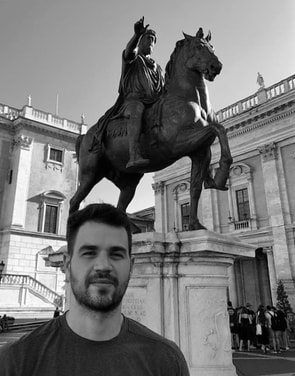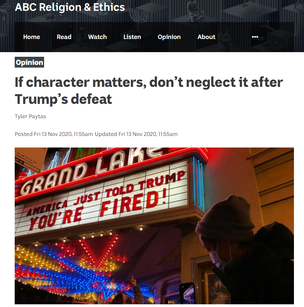"When it's time to leave the sun and moon behind, how will you react?"
|
I am a Senior Lecturer in Philosophy at Australian Catholic University. I work primarily in ethics and the history of philosophy. My current research focuses on virtue theory and negative emotions such as anger and fear. I am co-author of Plato's Pragmatism: Rethinking the Relationship between Ethics and Epistemology (2021) and co-editor of Kantian and Sidgwickian Ethics: The Cosmos of Duty Above and the Moral Law Within (2020). I am originally from Scottsdale, Arizona and I am an alumnus of Scottsdale Community College. I earned a PhD from Washington University in St. Louis under the supervision of Julia Driver, and subsequently held postdoctoral fellowships at Universität Stuttgart and the Dianoia Institute of Philosophy. Since 2021 I have served on the advisory board for EthicsFinder, an ethics search engine database hosted by ACU. |
Media and Public Engagement
|
I share Sidgwick's belief that as rational beings we are "bound to aim at good generally," which means that we ought to promote the good impartially rather than prioritizing ourselves, our loved ones, our nations, or our species. I also believe that two of the most effective means of promoting the general good are personal development and the open exchange of ideas and practical wisdom. I try to act in accordance with these beliefs by contributing to public discourse on topics such virtue, Stoicism, and animal welfare. I recently discussed some of these issues in an interview on Stoic Athenaeum.
In the aftermath of the 2020 US election, I wrote an opinion piece for ABC News in which I argued that the virtues of humility and compassion are incompatible with viewing Trump supporters as meriting contempt. |
|
My research on emotions and virtue theory has been featured on two episodes of the ABC RN program The Philosopher's Zone. In an episode from December 2018, David Rutledge and I discuss my view that fear is a structural vice. We also talk about the usefulness of Stoic teachings for overcoming fearfulness and coping with the various challenges of life.
The topic of a second episode was anger and the question of whether this emotion is ever justified. We discuss the reasons why I believe we ought to cultivate away our anger, despite the fact that it can have epistemic value and be a useful source of motivation. |
|
|
I discuss my work on anger and fear on the Micro-Digressions podcast hosted by Spencer Case. The conversation touches on a range of topics including retributivism and strategies for mitigating negative emotions. |
|
In an episode of the ACU Podcast Thinking Philosophy, Deborah Stone and I discuss my research on moral concepts and the idea of 'de-moralizing' ethical theory. I explain why I think moral concepts that have conceptual ties to blame are problematic. |
|
My writing on animal welfare includes an opinion piece for ABC News, in which I argue that while the motivations behind vegan activism are understandable, there are good reasons to believe that certain confrontational tactics are likely to do more harm than good. In an article for The Conversation, I address the issue of scientific research involving animals. I advocate for Australian researchers to adopt a pledge of transparency similar to the Concordat on Openness on Animal Research in the UK.
I have discussed some of these topics in radio interviews, including the ABC Radio National program God Forbid.
I am a recurrent guest on Inner Monologue, a RISE podcast hosted by Thomas Brown. RISE is a Phoenix-based community organization promoting mental health awareness. Inner Monologue covers topics such as mindfulness, creativity, and personal development.
In episode 61, Thomas and I begin by exploring some the moral issues depicted in iconic western films such as Tombstone and Unforgiven. We then discuss some of my research in virtue theory and Kantian ethics. I also share stories about my decision to pursue a career in philosophy, as well as the trials and tribulations of graduate school. (Interview starts at 16:00)
|
|
In episode 115, Thomas and I discuss the ways that language is used to manipulate others and the extent to which our perception of the world may fail to correspond to reality. We also talk about the importance of self-improvement as a means of improving the world. (Interview starts at 21:15)
|
|



